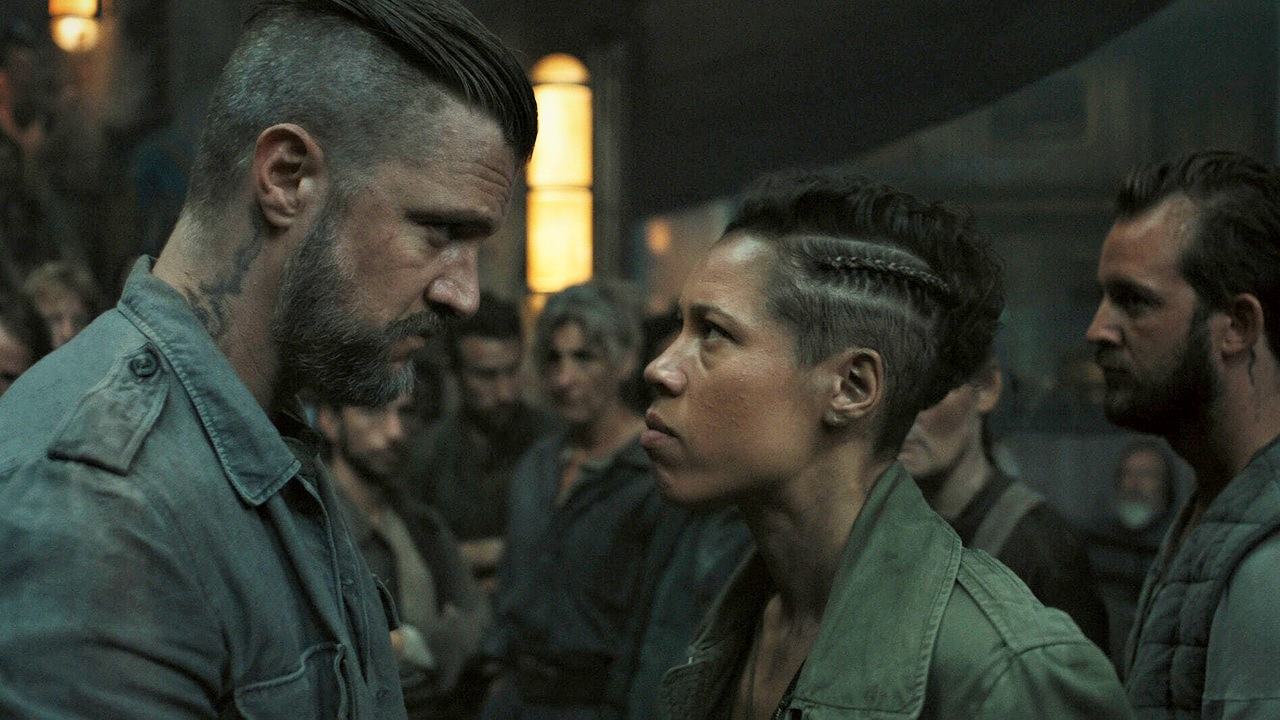
Episode 2, Order, thrives in its ability to blend tension with subtle revelations, advancing the narrative while staying true to its character-driven roots. Picking up the threads from the season premiere, the episode splits its focus between two compelling arcs. Juliette (Rebecca Ferguson) explores the barren wasteland outside her Silo, stumbling upon a neighboring structure that holds cryptic hints about their shared history. Meanwhile, Silo 18 spirals into chaos, as unrest among the inhabitants tests the boundaries of control and resistance.
The episode’s strength lies in its portrayal of the claustrophobic despair of Silo 18. The visuals are suffused with muted tones, evoking a sense of decay that mirrors the societal breakdown within. As the power dynamics unravel, Bernard (Tim Robbins) emerges as a figure of layered authority, grappling with rebellion in a way that challenges his own motivations. Robbins deftly humanizes his character, making him less of a villain and more of a tragic byproduct of a flawed system. Alongside him, Common's portrayal of Sims offers a stoic counterbalance, embodying the calculated brutality of the regime.
In contrast, Juliette's arc outside the Silo slows the pace but enriches the larger mystery. Her discoveries hint at a broader conspiracy, teasing the audience with just enough to keep the intrigue alive without overwhelming them with exposition. Ferguson balances grit and vulnerability, portraying a character out of her depth yet determined to uncover the truth. However, her storyline feels like it’s holding back; the revelations, while tantalizing, remain sparse, leaving much of the dramatic weight to Silo 18's unrest.
The pacing of Order is deliberate, almost methodical, and this can be both a strength and a weakness. The slower moments allow for introspection, drawing viewers deeper into the emotional stakes of the characters. However, some sequences—particularly in Juliette's storyline—feel stretched, as though the episode is withholding its punches to build anticipation for future episodes. While this approach is consistent with the show’s overarching tone, it might frustrate viewers looking for an immediate payoff.
One of the episode’s standout features is its exploration of moral ambiguity. The rebellion within Silo 18 isn’t portrayed as a straightforward fight for freedom but as a messy, often self-destructive movement fueled by fear and anger. The writers skillfully depict how desperation pushes individuals to make questionable choices, blurring the lines between heroism and villainy. This nuanced approach elevates the narrative, making the conflicts feel both personal and universal.
Visually, the show continues to impress. The design of the Silo captures the oppressive weight of a society trapped in its own decay, while the brief glimpses of the outside world are stark and haunting. The direction and cinematography complement the story’s grim tone, emphasizing tight spaces and shadowy corridors that reflect the characters’ internal struggles.
Yet, the episode isn’t without its flaws. While the tension is palpable, the lack of significant action or major plot progression might leave some viewers yearning for more momentum. The balance between character-driven drama and sci-fi intrigue tilts heavily toward the former, which, though rewarding for some, risks alienating those drawn to the show’s dystopian premise.
Despite these shortcomings, Order excels in its ability to evoke a sense of unease and curiosity. The episode is less about grand revelations and more about the slow build of pressure, setting the stage for what promises to be a gripping season. It continues to delve into the psychological and societal impacts of life in the Silo, crafting a story that feels deeply human even amidst its high-concept premise.
In the end, Order solidifies Silo's position as a show that prioritizes depth over spectacle. It asks its audience to invest in its world and characters, rewarding patience with a narrative that lingers in the mind long after the credits roll. For fans of thoughtful, layered storytelling, this episode is another reason to remain hooked. For those craving faster-paced developments, it’s a reminder that sometimes the best stories take their time.
Final Score- [8/10]
Hi Everyone, after a due consideration, we have decided that we will be open for donations to help us in managing our website. We will be greatful for any kind of amount we receive. Thanks!
— Midgard Times 🎬 (@Moviesr_net) January 4, 2026
PayPal- [email protected] pic.twitter.com/DlNNz5Npm5
Get all latest content delivered to your email a few times a month.
Bringing Pop Culture News from Every Realm, Get All the Latest Movie, TV News, Reviews & Trailers
Got Any questions? Drop an email to [email protected]